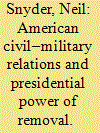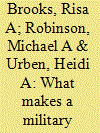|
|
|
Sort Order |
|
|
|
Items / Page
|
|
|
|
|
|
|
| Srl | Item |
| 1 |
ID:
190779


|
|
|
|
|
| Summary/Abstract |
Under what conditions are presidents more likely to remove senior defense officials from office? Using a novel data set of all senior U.S. defense officials, both civilian and uniformed military from 1947 to 2021, this article explores whether anticipated support in Congress, partisan factors, or institutional protections for the military affect observed patterns of removal for defense officials. The results suggest that presidents are more likely to remove their own appointees (or their co-partisans’ appointees), but provide little evidence that presidents premise removal on anticipated partisan support for a replacement nominee in Congress. Moreover, the results suggest that military officials may have some insulation from politicization by strong forms of removal, though that protection may weaken an important aspect of civilian control of the military, the threat of punishment by removal, raising profound questions for how civilian control endures.
|
|
|
|
|
|
|
|
|
|
|
|
|
|
|
|
| 2 |
ID:
187105


|
|
|
|
|
| Summary/Abstract |
Scholars have contended that norms of professionalism are critical to understanding how militaries interact with civilian leaders and when they intervene in politics. Yet, few studies have directly examined the normative structures of military officers. Through a survey of 1468 US Military Academy cadets, this study evaluates cadets’ views toward professionalism, and in particular what is often presumed to be the dominant framework of those norms based on Samuel Huntington’s The Soldier and the State. We identify five patterns of normative beliefs based on cadets’ views of civil–military interaction and the nonpartisan ethic: orthodox, unorthodox, inconsistent, non-committal, and motivated norms. Cadets fall into each of these categories, but approximately one-quarter demonstrate motivated norms, adhering when convenient, and otherwise dispensing with them when the rules they prescribe clash with their partisan identities. These findings, especially our novel conceptualization on norm adherence, contribute to a greater understanding of military culture and professionalism.
|
|
|
|
|
|
|
|
|
|
|
|
|
|
|
|
|
|
|
|
|